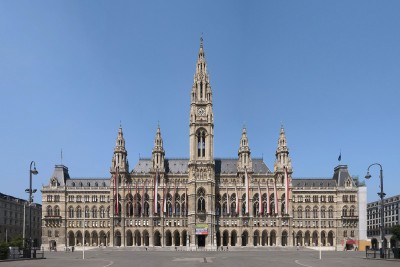Politicians in Vienna Demand Easier Access to Austrian Citizenship
Heated debates recently took place in Vienna's provincial parliament when the parties jointly discussed making it easier to obtain Austrian citizenship. Besides fears that such a facilitation would "devalue" Austrian citizenship, there was also a lot of support and calls for a more open Austria. The debate was fuelled by Federal President Alexander Van der Bellen, who had recently spoken out in favour of a simpler process in an interview.
 The meeting was held in the Vienna City Hall. / Picture: © Wikimedia Commons / Thomas Ledl / CC BY-SA (https://creativecommons.org/licenses/by-sa/4.0)
The meeting was held in the Vienna City Hall. / Picture: © Wikimedia Commons / Thomas Ledl / CC BY-SA (https://creativecommons.org/licenses/by-sa/4.0)
Recently, the Vienna Parliament met to jointly debate the pros and cons of lowering the requirements for Austrian citizenship. The Austrian People's Party (ÖVP) stuck to its line and demanded that Austrian citizenship not be "devalued".
The ÖVP was able to justify this stance by saying that one of the most important issues in a democracy is citizenship. Previously, a heated debate had been launched in Austrian domestic politics after Federal President Alexander Van der Bellen demanded in an interview that the hurdles for citizenship be lowered.
Vienna's mayor Michael Ludwig had also raised demands such as the reduction of bureaucratic and financial obstacles to acquiring citizenship - especially for those born here. Markus Wölbitsch-Milan of the Austrian People's Party, on the other hand, said that the SPÖ, to which Michael Ludwig belongs, was campaigning between the lines.
Before the requirements are eased, the application process should first be made more efficient so that people "who apply for citizenship after six years do not have to wait months or years for a callback from the authorities". In other federal provinces, the processing time for applications is on average less than six months, only in Vienna is this period significantly longer.
He demanded that citizenship should not become a "cheap mass product" but remain a quality product, as "the current rules for naturalisations are well thought out and ensure that citizenship is only at the end of a successful integration process," said Wölbitsch-Milan.
The current handling is ideal for Austria's needs. The ÖVP wants to prevent an "immigration into the social system" and advocates the approach that one has to earn Austrian citizenship. For skilled workers, whom Austria urgently needs, there is already the Red-White-Red Card.
Representatives of the Greens had a different opinion. Nikolaus Kunrath of the Greens began by explaining that daily work and conversations with the population showed that it was not a question of citizenship how people behaved on the street and integrated into society. There is also no connection between citizenship and education.
Everyone has the right to a nationality. More and more countries around the world are accepting dual citizenship. This would bring substantial advantages for states and people. In order to provide opportunities for all people, it was important to expand citizenship and make it as open as possible.
The Vienna SPÖ called for a "fair, modern and progressive" citizenship law. People who contribute a lot to society are currently excluded from citizenship, which should be changed. Several points were necessary for faster naturalisation: For example, six years of residence in Austria should suffice for a successful application.
In addition, a child born in Austria should be granted citizenship if one parent has already lived in Austria for five years. The income limit should also be lowered and provincial fees should be harmonised at a low level in all federal provinces. The citizenship examination should be replaced by a citizenship course. Germany and the Scandinavian countries are models in this respect.
Selma Arapovic, a representative of the NEOS, made it clear that "nobody" here in the House wanted a "frivolous award and devaluation" of citizenship, then that would be absolutely irresponsible. Rather, what was required was fair, simplified and comprehensible legislation to achieve citizenship - "but the ÖVP has not wanted that for more than 20 years".
It is a "big problem" for democracy in Austria if only 0.6 to 0.7 percent of all non-Austrians living here obtain citizenship every year. Citizenship is often a necessary prerequisite for personal and professional advancement: "I could not stand here and speak without citizenship. Because I would be neither a politician nor a civil engineer without citizenship".
Her motivation for applying for citizenship 20 years ago was above all the tightening of the political tone in Austria and the relevant laws: "The sentence 'If someone is called Adamovich, you have to ask yourself whether he has a valid residence permit' horrified me and I was really stunned. That's why I decided to flee forward and go to the safety of citizenship," she said.



